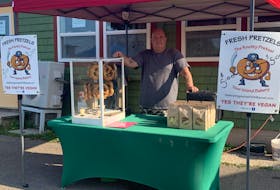Halifax hip-hop artist Corey Writes can recall the novelty of first learning about MP3s. For him, as a fan, it was a pretty wild moment.
"Sam The Record Man, you've got HMV, you've got all these independent little spots that sell CDs, and you go in and artists used to put out albums with 24 or 25 songs," he recalled. "And then MP3s came, and it's like, I can put 1,000 songs on this one CD? What? Being able to have a variety like that on a couple of discs, it just went from having those cases you put your CDs in and zip them up, it went from having 50 of them books in alphabetical order for CDs to one book."
Who could have ultimately predicted that the MP3 — first released with the common filename extension .mp3 in 1995 to replace .bit — would set in motion a chain of events leading to a world where music is mostly listened to online, streamed to phones or computers.
The two retail chains Writes mentioned are long gone, leaving independent stores and online retailers to meet the needs of fans who still enjoy CDs and vinyl LPs. Otherwise, it's streaming services like Spotify, Apple Music and Tidal.
For artists like Writes, an up-and-comer who was nominated last year for a Music Nova Scotia award for Hip-Hop Recording of the Year, streaming represents a blessing and a curse.

"They're good, because they give you a platform to put out your music and be heard, but at the same time, I should make more than one thousandth of a penny if someone listens to my song," he said.
According to the Recording Industry Association of America (RIAA), sales of CDs in the United States peaked in 2000 at $13.2 billion, accounting for more than 92 per cent of all sales revenue.
This period also coincided with the rise of illegal file-sharing services such as Napster. The widespread sharing of music for free started to cut into music sales. By 2008, U.S. CD sales were down to $5.5 billion. Eleven years later, in 2019, that number reached a minuscule $614 million, accounting for only 5.5 per cent of total sales revenue.
By comparison, the paid subscription format generated only $149 million in 2005 (the first year RIAA tracked sales revenue for it), but last year it raked in $5.9 billion, representing over 53 per cent of total sales revenue for the U.S.
MP3 impact
Joel Plaskett, one of Nova Scotia's most popular musicians, has been in the music industry going back to his late teens fronting Thrush Hermit, and has since built a successful solo career. He recognizes the impact of MP3s.
"It did dismantle a big piece of the industry in the sense that the revenue stream changed, and people recognized they could access things for free," Plaskett said. "In the structure of the capitalist universe that we live in, it was sort of like the music industry was a wooden box in the ’80s and ’90s. I came up in the record industry before you had the digital revolution. CDs came along, and people found a way to sell you something you already had on CD again. They were always trying to capitalize on that. It was like a wooden box.
“And then Napster came along. It was like, now I'm carrying a cardboard box. And now it's streaming, and it's kind of raining and you're carrying a cardboard box as a musician."

Plaskett says he was fortunate to have his profile as a solo artist rise consistently through the first decade of the 21st century. His best-selling recording to date remains the 2009 triple-album "3," which Music Canada certified gold. In general, his sales continued to grow throughout the first decade of the new millennium. That experience helped him build a solid fan base that remains to this day.
He has also kept his touring operation pretty lean, never making use of a tour bus and only travelling with his fellow musicians and a road manager who can also handle sound — Plaskett admits he did splurge once and also bring a lighting tech.
"My live draw has always outstripped my record sales," Plaskett said. "I have a large handful of really dedicated fans who come to my shows and buy my records and buy a T-shirt and support what I do. That has never changed. I built on that, and I continue to build on it, despite the fact that sales are going down."
Shelley Chase backs up Plaskett on the growing importance of tours for musicians. She is the founder and owner of Garrison Hill Entertainment. Chase has been based in Newfoundland and Labrador and, more recently, New Brunswick since starting her business in 2005. She has managed recording artists in the past and these days handles a lot of different tasks for musicians, including booking tours for both Canadian and international artists.
"It's the live shows that support the artist now," Chase said. "It used to be the other way around. You'd tour to support the album. But the MP3 has completely inverted the business model."

Streaming money
Plaskett views streaming services as a tool for basically offering free access to music. For the artist, they only pay off monetarily if their profile as a musician reaches a certain level. Although he largely leaves keeping track of where his revenue as an artist comes from to his manager, Plaskett is aware there are tiny amounts of money coming from a lot of different sources.
Plaskett considers himself lucky to be in the position to have a manager who can chase that revenue for him, as he reckons this work administratively would be too time consuming for a lot of independent musicians to handle on their own.
"Streaming pays some," he said. "It doesn't pay enough, in my opinion."
While the sound quality of steaming services and MP3s have improved over time, Plaskett says it doesn’t compare to what a person can hear by playing a vinyl record on a good stereo system.
"It's not the same," he said. "But it can give you the same emotion, because if somebody puts on headphones ... a song can still connect."
Chase and Writes both view physical copies of albums today as promotional tools, given the limited amount of money they can make for an artist these days.
"There's bands that have obviously broken that model and exist as their own unique scenario — for instance, Shanneyganock in Newfoundland," Chase said. "Crazy records sales. They break every mould. There's no way they should be selling as many CDs as they do in 2020. But they do."
"I came up in the CD era," Writes noted. "CDs aren't really like CDs nowadays. CDs are more considered just merch. I'll have a show here and give out some CDs, or you guys want to pay for a CD. That's appreciated, too, but I don't look at it as selling CDs anymore, because most everything is digital. Why would they pay for the CD when they can just have it right in their phone?"
Like Plaskett, Writes understands the importance of building a fan base and views it as the key to becoming a self-sustaining musical artist.
"It starts with your fan base and collaborations," he said. "Me, I'm an artist, and who supports me, supports me. Every day I get a few people who will follow me, and every so often you get that one core fan that you can add to the list, and they support everything you do. They're at your shows, they buy your merch. They mess with you heavy. They hear your music and they love it and appreciate it. ... People think you need 100 million of those fans or you need half the world chanting your name. Not necessarily, because if you release music, two albums a year, maybe a single every two months, a show every month, if you have 100 fans that love you, then you can make a living off music."
Whatever money he does make from his music, Writes reinvests it in himself for marketing.
"Don't take it and take the girl out to eat or make a nice down payment on a car — none of that stuff," he said. "Put it right back into your monster."
Retail scene
While CDs have become less popular and most of the big music store chains from yesteryear are long gone, independent shops like Fred's Records still find a way to survive. It has remained in business at the same location on Duckworth Street in downtown St. John's since 1972. Among it bestsellers these days is the latest CD from the aforementioned Shanneyganock.
"There's always been huge, mega competition on a large scale," said owner Jim Brokenshire, brother of the store's namesake and founder, Fred. "In the earliest days, it was Woolco with their racks of low-priced records to entice people into their store to buy bird cages and hockey pads. That was tough for us back then. Record clubs, national chains and now the online environment. There's room for both."

Brokenshire said there remains a solid market of customers who enjoy the experience of looking through stacks of CDs and vinyl records. The latter has proven to be a big help for stores like Fred's. Almost extinct through the 1990s, sales have grown every year since 2005, according to RIAA data. Vinyl LP and EP sales went from $14.2 million in 2005 all the way to $497.6 million in 2019 — an astounding 3,504 per cent increase over that period.
There was a time in the early millennium when vinyl accounted for only a small section of Fred's inventory, with just a few dozen titles available. It now has a massive vinyl stock and routinely participates in yearly events like Record Store Day, an event tied to limited-edition releases on vinyl.
"There's a boom of interest in vinyl, and then there's a whole generation that's discovered it and fallen in love with it," Brokenshire said. "It's certainly a large part of what we do."
Plaskett remains a firm believer in the value of being able to hold a physical album in your hand.
"My music can go around the world on a streaming service in a way that it can't through distributing, but I still do on some level love the physical version of a record. To me, that's still the way I present my music because of the era I came out of."
In a fairer world, Plaskett would like streaming music to be handled in a manner similar to a video streaming service like Netflix.
Unlike music streaming, where the user tends to pay for only one service provider on a monthly basis, many people pay for more than one video streaming service in order to get a better selection of viewing options.
"The history of movies is not on Netflix," he said. "It's a very limited curation of television and movies. ... Then it gets split up amongst all these different services — Crave and all these TV platforms — and you're basically paying as much or more than you would for cable to get a bunch of things. ... Should the history of recorded music, or a huge part of it, every Beatles record, every Led Zeppelin record, every Joel Plaskett album, be available for $9.99 a month? It seems unsustainable in terms of the future of younger artists."
***
Touring trouble
The popularity of streaming services for listening to music has made income from tours and concerts all the more important for recording artists and musicians. A pandemic is not helping matters at all.
“We work on an 18- to 24-month cycle as booking agents,” said Shelley Chase, owner of Garrison Hill Entertainment. “The work that was secured for this season — let's say from May to October — it took me two years to secure those dates, because you're working far out on tour schedules. Just because you have a venue that's interested in an artist doesn't mean that it actually works that year, because you have to line up all the other venues to make it work.
“We lost two years’ worth of work, but we also have been prevented from booking two years out. So, we'll be affected for another two years, maybe up to five years, (before) resuming a normal touring schedule.”
Chase is not a fan of live music moving to virtual online shows, as she feels the audience reaction is an essential part of what makes live music special.
“It's the shared experience,” said Chase, who is also a performer. “And I don't care how many Zoom concerts you do, you can't recreate that.”
Chase was recently part of an event in Sackville, N.B., called “Levee on the Lake.” A stage was set up at the edge of a lake, with spectators enjoying live music from the comfort of boats and kayaks.
“It's a drive-in, essentially, but it's open-air,” Chase said. “People are still hearing that bass sound pumping through your chest. ... We can't lose that, and we're going to lose it.”
Chase says almost all arts funding of late is going toward virtual events. She says some money should go to live music venues to make sure they can get artists back onstage.
“If you're a drummer, it's very dire. Guys with guitars are playing solo, but a drummer?”









